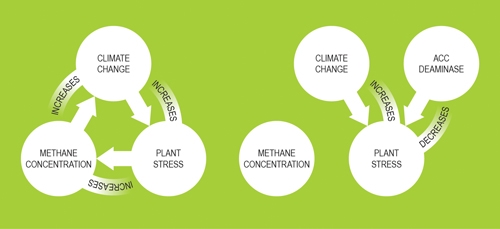Soil bacteria may promote tree growth and mitigate climate change

Plant growth promoting bacteria in the soil produce ACC Deaminase, which reduces a plant's production of excess ethylene when under stress.
Research into how a group of growth promoting bacteria help plants cope with environmental stress may have major implications for scientists worldwide trying to piece together the full picture of global warming.
The less obvious impacts of a changing climate have Scion’s microbial ecologist Dr Simeon Smaill digging below the surface of the soil to investigate what effect these changes may have on a plant’s capacity to produce food and fibre in the future. Simeon’s research into the pivotal relationship between plants, soil bacteria and global warming has recently been published in the prestigious international journal, Trends in Plant Science.
“It’s a vicious circle,” says Simeon. “Extreme weather as a result of the changing climate places plants under stress. In response to this stress, plants produce massive quantities of ethylene, initiating short term survival tactics such as leaf loss and reduced growth. In many cases, this reaction causes more damage to the plant than the stress itself.
“However, ethylene also blocks a process in the soil where bacteria called methanotrophs break down methane. The result is that the soil cannot capture methane, leaving more in the atmosphere. With methane being a major cause of global warming, the extreme weather – plant stress – methane production cycle is accelerated.”
Methane is a potent greenhouse gas and although present in small concentrations is responsible for a large portion of global warming, second only to carbon dioxide (CO2). Any alterations to the methane concentration in the atmosphere will therefore have a considerable effect on global warming and weather conditions.
“There are many sources of methane – livestock, fossil fuel production and wetland emissions,” says Simeon. “But there are only two sinks – atmospheric oxidation and oxidation by these soil methanotrophs, which are found predominantly in forest ecosystems.”
Preserving the methanotrophs’ ability to capture methane when plants are subject to stress may prove a vital key to regulating the methane-global warming balance, and this is the core of Simeon’s research. The activity of a second group of “plant growth promoting bacteria” – so called due to their abilities to improve plant productivity - may provide the answer. These bacteria have the ability to slow down a plant’s production of ethylene by producing an enzyme referred to as ACC-D1.
“Plants normally produce ethylene at low concentrations as part of their physiological processes. What we are interested in is being able to stop a plant producing excess ethylene when it’s under stress.
“The enzyme ACC-D reduces a plant’s production of ethylene and allows it to respond to stress more effectively. This has been proven to increase plants’ tolerance to stress. It may also limit the amount of ethylene released into the soil, allowing methanotrophs to continue breaking down methane.
“For instance, we have already noticed there are some radiata pine strains that have greater levels of the ACC-D enzyme in the surrounding soil, suggesting there is some sort of signalling going on between those particular plants and the bacteria. This probably helps makes these strains more tolerant to certain stressful conditions like drought, for example.
“We want to capture this information. While there is detailed knowledge around some aspects of plant physiology, we don’t yet fully understand the complex relationship between plants, microbes, and soil systems.
“It’s possible we may be able to harness these ACC-D producing bacteria not only to help plants cope better under stress, but also to address a significant piece of the global warming jigsaw, helping future proof both planted forests and wider plant ecosystems against a changing climate.”
1 1-aminocyclopropane-1-carboxylate (ACC) deaminase.
Contact
Dr Simeon Smaill at: Show email
